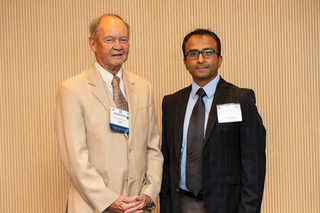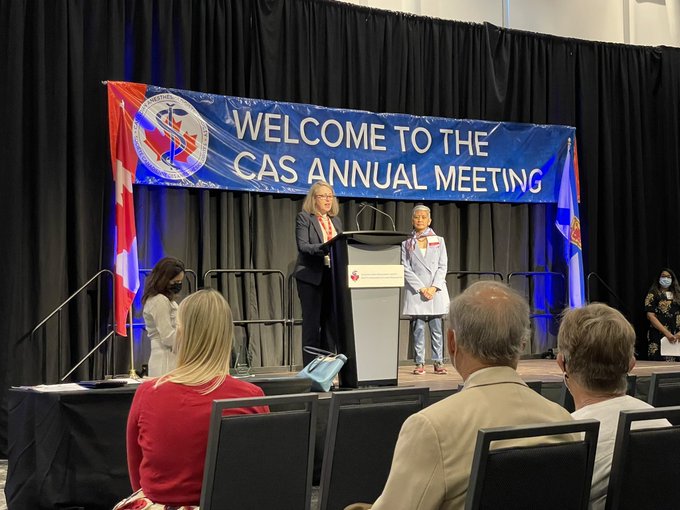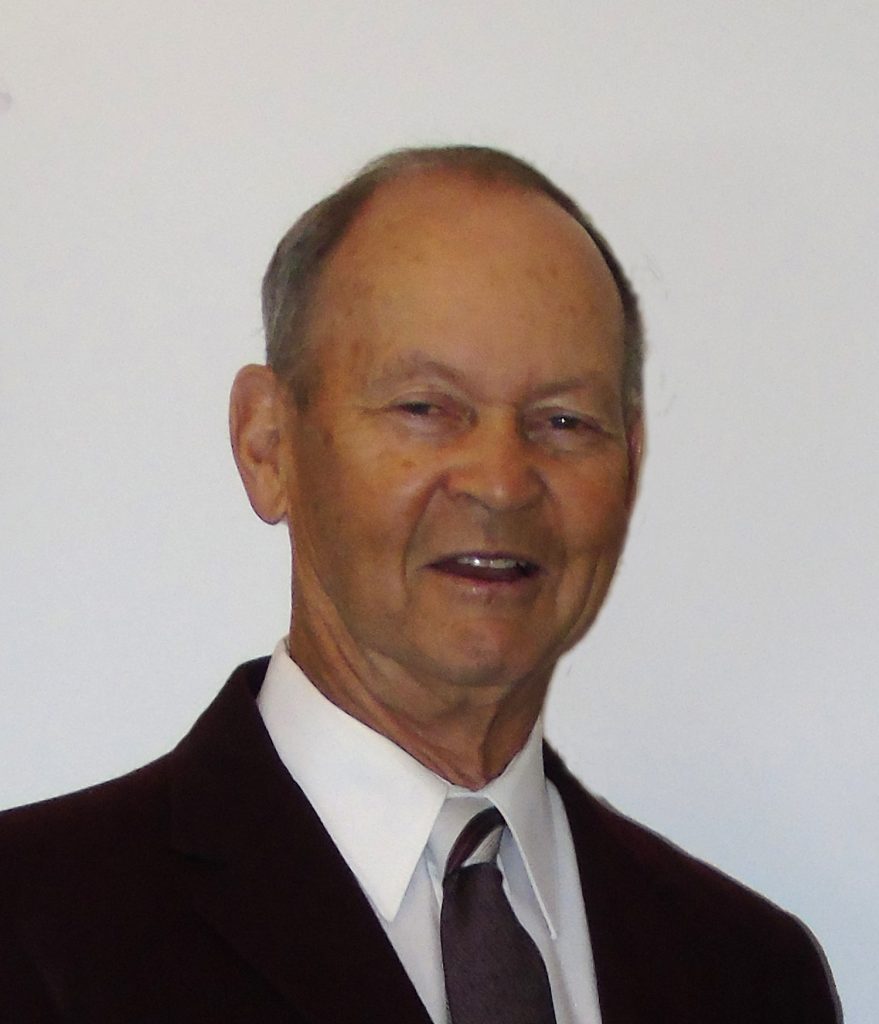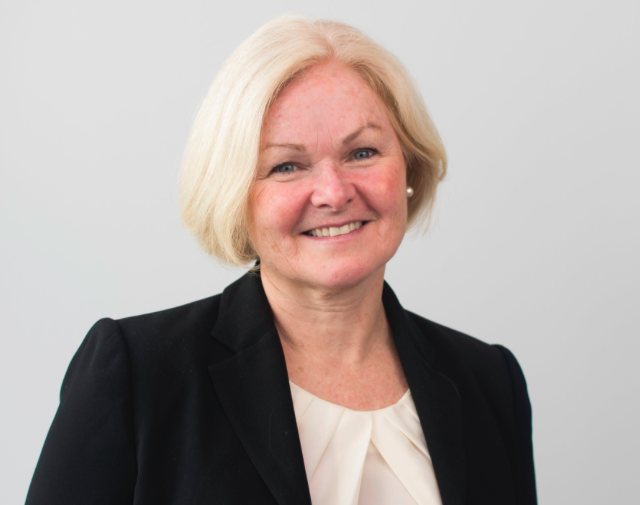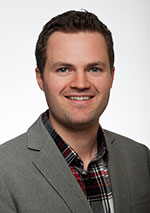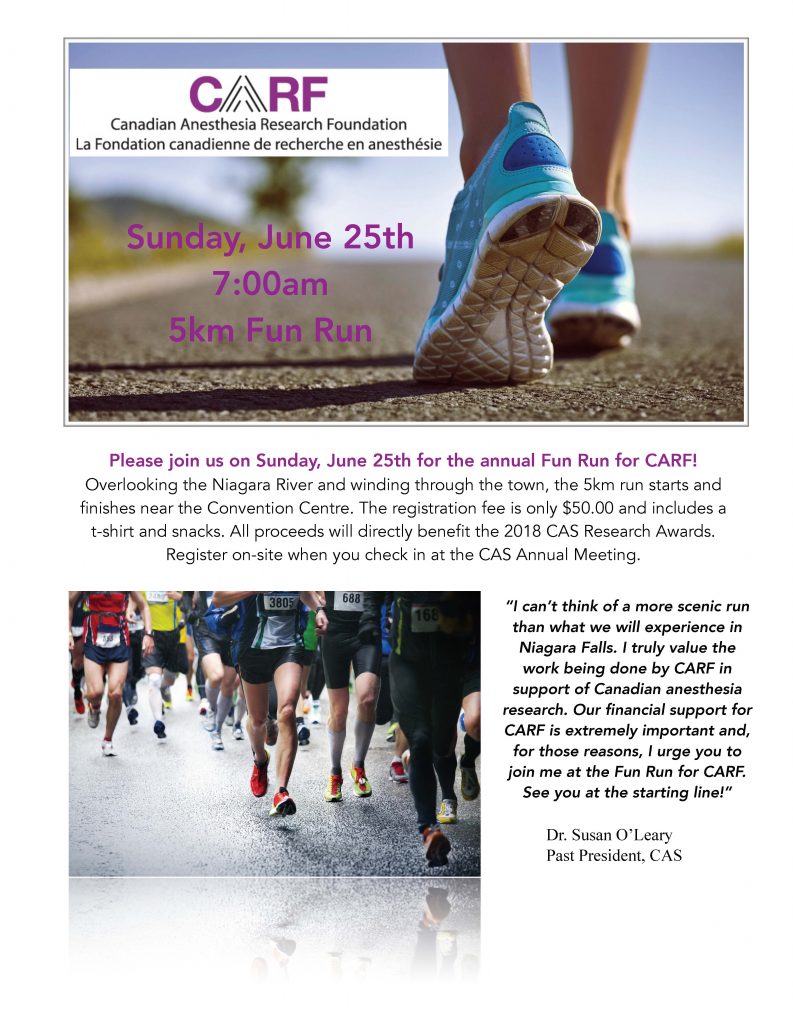If you are attending CAS 2024 make sure you join us for the CARF/CASIEF Kick Off Party! CARF-CASIEF Event Poster with QR code
The latest news from CARF
CAS FOUNDATIONS WORKING TOGETHER
The 2 foundations of the CAS, CARF and CASIEF, have decided to work closer together to foster both internal education and research. At the next CAS meeting in Victoria the CAS Foundations will be hosting a joint event on Friday, June 7th, 2024 at the Victoria Public Market starting at 6:30 pm. Funds raised from this event will be divided between Change4CARF and CASIEF. Change4CARF is dedicated to supporting the career scientist award.
CASIEF AND CARF Silent Auction.
The 2022 Dr. James Beckstead Award
In 2020, CARF received a major gift donation of shares from Dr. James Beckstead and his wife to support an award in his name. In 2022 at the CAS Annual Meeting, CARF was incredibly proud to present Dr. Harsha Shanthanna the Dr. James Beckstead Award – for the first time! – valued at $20,000.
Dr. Shanthanna was awarded this grant to support his research titled “Opioid Reduction and Enhanced recovery in Orthopaedic Surgery (OREOS)-Knee: A Pilot Randomized Trial“.
Dr. Beckstead served as a Treasurer for the Canadian Anesthesiologists’ Society (CAS) for 5 years, and is a committed and dedicated leader in the anesthesia community.
We thank Dr. Beckstead and his wife for this generous donation that will help transform the future of anesthesia research in Canada. To learn more about how to donate stocks and shares, please send us an email or connect with us on social media.
Congratulations, Dr. Doreen Yee!
At the CAS Annual Meeting in Halifax this year, Dr. Doreen Yee, Chair of CARF was awarded the “Outstanding Volunteer Award” along with Dr. James Kim.
Dr. Yee has been the Chair of CARF for over a decade, and the driving force behind it’s success. We congratulate her on winning this award, and for dedicating countless hours to securing the future of CARF!
Major Gift Announcement!
We’re incredibly thrilled to announce that CARF has received a major gift donation of shares from Dr. James Beckstead and his wife. The donation will be used to create an endowment fund that will fully support an award in Ambulatory Research in his name.
Dr. Beckstead served as a Treasurer for the Canadian Anesthesiologists’ Society (CAS) for 5 years, and is a committed and dedicated leader in the anesthesia community.
“Over my 42 year career as a clinical anesthesiologist, I have seen tremendous advances in the practice of anesthesia. These changes have been the result of the tedious process of ongoing research. I am pleased to support CARF and the young investigators that they in turn support. Research is the future and at a time when other funding sources are scarce, it is important that we support our speciality through CARF”, Dr. Beckstead writes.
We thank Dr. Beckstead and his wife for this generous donation that will help transform the future of anesthesia research in Canada. To learn more about how to donate stocks and shares, please send us an email or connect with us on social media.
The 2020 Research Program is now open!
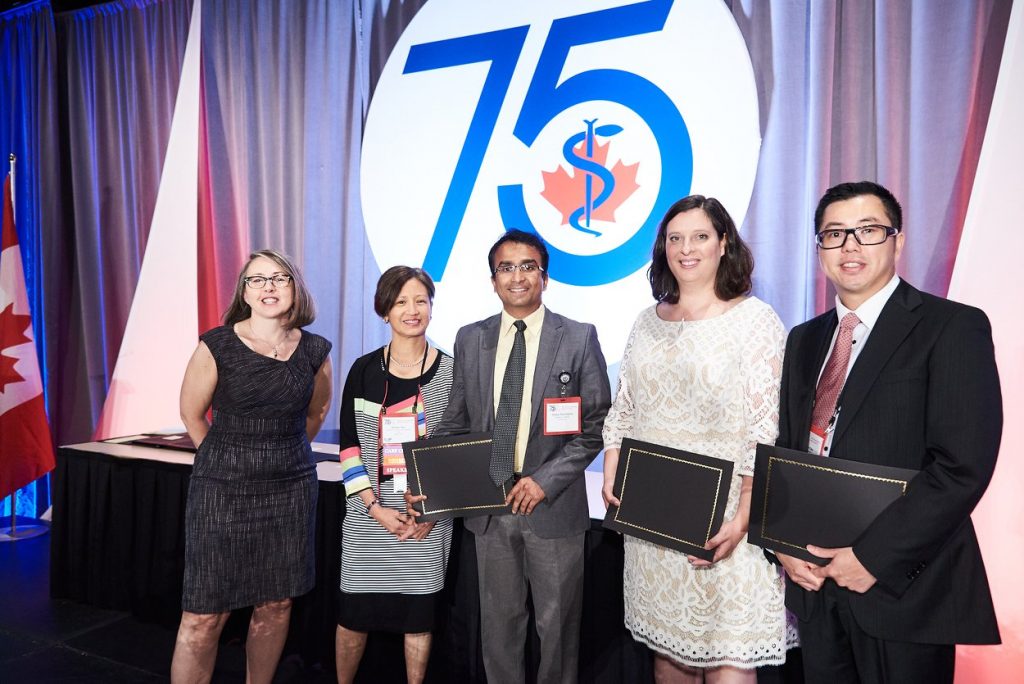
If you, or someone you know is interested in applying for an Operating Grant or Career Scientist Award, please apply by January 3rd, 2020.
The CAS Research Program was launched in 1985, when the first annual CAS Research Award was presented to Dr. Howard Nathan for his work on “Anesthetics and Myocardial Ischemia”. However, it became a possibility six years earlier, through the establishment of the Canadian Anesthesia Research Foundation (CARF) in 1979.
Today, the Program administers almost $200,000 annually, through CARF, and provides support to researchers in anesthesia who are CAS members. If you have been a CAS member for at least 2 years (the year of submission and the previous year) you can access two types of grants:
OPERATING GRANTS
Operating Grants provide funding to cover the direct costs related to a single research project. Although the grant number and amount might differ from year to year depending on sponsorship opportunities, we generally offer:
- New Investigator Operating Grants, for applicants who have commenced independent practice/received their first faculty appointment within five years of the application deadline, or have undertaken significant research training (i.e., obtaining a Master’s degree or PhD) within the past three years.
- Open Operating Grants
- Residents’ Research Grant, for individuals committed to doing research during their residency training.
Regardless of category, the submissions are peer-reviewed by our Research Advisory Committee and adjudicated during a review meeting by the Grant Standing Subcommittee. The winners’ list is approved by the CAS Board, and all awards are administered through the CAS office.
The submission period lasts from November to January and winners are established in April. Please check this webpage closer to the opening date for further details.
If you have any questions regarding the Program, please email us at research@cas.ca
Congratulations to Dr. Beverley Orser
Dr. Beverley Orser, who is a past CARF award winner, and Dr. Zulfiqar Bhutta have been elected to the National Academy of Medicine – two of only 159 non-American members of the prestigious organization.
Dr. Orser, a professor of physiology and chair of the Department of Anesthesia, was chosen for her groundbreaking discoveries around anesthesia and memory impairment.
The Academy’s 2,178 members provide independent advice and analysis to support public health and medicine in the United States. Members are elected on the basis of outstanding professional achievement and commitment to service. The two medical researchers join five existing members from U of T, including former President C. David Naylor.
Orser, who is also Co-Director of Research in the Department of Anesthesia at Sunnybrook Health Sciences Centre, recently spoke with writer Heidi Singer about the honour, and her research.
How will your election to the Academy affect your work?
It’s an incredible honour. Understanding the mechanisms of anesthesia is kind of orphaned as a field. Everyone takes the safety of anesthetic drugs for granted, and patients assume we know how the drugs work, but we don’t really. So it can be hard to make people understand why we need to learn about their underlying cellular mechanisms. So this honour brings attention to a field of medical research that’s often ignored.
The field has advanced incredibly, but we’re still in the tail end of the ‘ether era.’ We still use inhaled drugs that cause global neuro-depression – they cause unconsciousness but they also suppress breathing and blunt vital airway reflexes. We’ve learned how to circumvent those adverse effects through second-by-second monitoring and certain techniques. But what if we had a class of drugs that didn’t cause life-threating adverse effects? Imagine if safe anesthetic drugs were available to people who didn’t have access to advanced monitoring and highly trained anesthesiologists? Safer anesthetics is the dream, but that dream begins by understanding how the medications we have available work.
There’s an even wider value of this research: anesthesia can help us to gain fundamental insights into the molecular basis of the processes we disturb – like memory and consciousness. In order to understand a system, you often have to perturb or disrupt it. These drugs are doing that. The insights we gain far extend beyond the realm of the operative period. The insights we are gaining can impact fields including traumatic brain injury, stroke, dementia and other cognitive disorders.
You’re known for making the connection between anesthesia and memory impairment. Can you explain what that is?
We know memory loss is one of the most important features of the anesthetic state. You don’t want to remember your time while you are undergoing anesthesia and surgery, but how do the drugs cause memory loss? We’ve discovered receptors that are highly sensitive to commonly used anesthetic drug, which inhibit memory.
And we found these receptors are very sensitive to even low concentrations of drugs that cause memory deficits. And the increase in receptor activity doesn’t go away completely once the drugs are gone. Something is continuing to upregulate the number of these receptors on the surface of neurons that are critically involved in memory. We postulate that’s a major reason why we still see some lingering subtle effects on memory after anesthesia.
Fortunately, those subtle changes in cognition don’t last long in most patients. But they may contribute to serious disorders that occur in the postoperative period such as delirium. In animals, we know that blocking those overabundant receptors will restore cognition in the post-anesthetic period. And we’ve developed new molecules to inhibit the overexpression of receptors and are repurposing drugs that inhibit their function for use in the postoperative period.
There’s also a drug that will reduce delirium post-op in patients, called dexmedetomidine. Although it works on an entirely different receptor system, we discovered that it does reduce the overexpression of these memory-suppressing receptors and restores cognition in laboratory animals. We’ve mapped out that pathway so we can look for other drugs that would do the same thing with fewer side effects. This discovery just further strengthens the hypothesis that overexpression of these “memory-blocking” receptors contribute to cognition deficits in patients.
How might your membership in the Academy advance your research in this area?
research is hard to fund, and perhaps this honour will help other investigators. It may help draw attention to studies of post-operative patients such as those who experience acute and chronic pain and those taking excessive opioids or suffer from postoperative depression. It would be a huge advance in the war on opioid addiction if physicians could reduce the amount of opioids they give out after surgery, when dependency often begins.
CARF @ CRAFT – June 21 2019
CARF is beyond excited to announce an inaugural fundraising event at this year’s CAS Annual Meeting! After the Welcome Reception on Friday, June 21st, CARF is hosting a a spectacular evening at Calgary’s Craft Beer Market to raise awareness and funds for the Career Scientist Award! Tickets are only $50/person which includes delicious local foods and beer. You can reserve your tickets when you register online for the Annual Meeting. Spread the word!
Congratulations to Dr. Daniel McIsaac
CARF is excited to share some amazing news from Ottawa! The 2017 CARF Award Winner of the prestigious Career Scientist Award, Dr. Daniel McIsaac, has secured $1.1 million for his trial “parallel arm multicenter randomized trial of frailty-focused preoperative exercise to decrease postoperative complication rates and disability scores”. Just another testament to the importance and impact of the Career Scientist Award! Congratulations on this outstanding achievement, Dr. McIsaac.
Position Available: CARF Trustee

CARF Board of Trustees Position Vacancy.
Mission: To provide sustainable funding for Canadian research in anesthesia, pain and perioperative medicine.
Vision: Helping people through perioperative research.
Each Trustee serves without compensation, and carries a specific role on the Foundation Board in support of its fundraising and in the management of the endowment. Board attendance is required for three teleconferences annually as well as the Board Meeting scheduled during the Annual Meeting in June.
Duties:
The CARF Board of Trustees have full and final responsibility to control the property held by CARF and to manage the Foundation as an independent organization as dictated by the requirements of the Income Tax Act related to Registered Charitable Organization. The Board of Trustees shall have the power to adopt such Rules and Regulations as it deems necessary or desirable for carrying out the activities of CARF. Trustees shall be elected by majority vote of the CARF Board of Trustees.
Term of Position:
Each Trustee shall office for a term of 3 years subject to renewal twice for a maximum of 9 years. A Trustee’s term shall be deemed to commence with the Annual Meeting of the CARF Trustees and following the date of his/her election to the Board.
If you are interested in applying for this position, please provide us with the following information:
A Brief Bio
Letter of Intent
If you are interested in applying, or would like to nominate a colleague, please send the information to carf@cas.ca
Register for the 2017 Fun Run for CARF!
Position Available: CARF Board of Trustees, Ontario Rep
Vision:
Improving perioperative outcomes through research and knowledge generation
Mission:
To provide sustainable research funding in Canada for the advancement of anesthetic care and perioperative medicine
Each Trustee serves without compensation, and carries a specific role on the Foundation Board in support of its fundraising and in the management of the endowment. Board attendance is required for three teleconferences annually (September, December, and March) as well as the Board Meeting scheduled during the Annual Meeting in June.
Duties:
The CARF Board of Trustees have full and final responsibility to control the property held by CARF and to manage the Foundation as an independent organization as dictated by the requirements of the Income Tax Act related to Registered Charitable Organization. The Board of Trustees shall have the power to adopt such Rules and Regulations as it deems necessary or desirable for carrying out the activities of CARF. Trustees shall be elected by majority vote of the CARF Board of Trustees.
Term of Position:
Each Trustee shall office for a term of 3 years subject to renewal twice for a maximum of 9 years. A Trustee’s term shall be deemed to commence with the Annual Meeting of the CARF Trustees and following the date of his/her election to the Board.
If you reside in Ontario and are interested in applying for this position, please provide us with the following information no later than April 30th 2017.
- A Brief Bio
- Letter of Intent
If you are interested in applying, or would like to nominate a colleague, please send the information to carf@cas.ca
